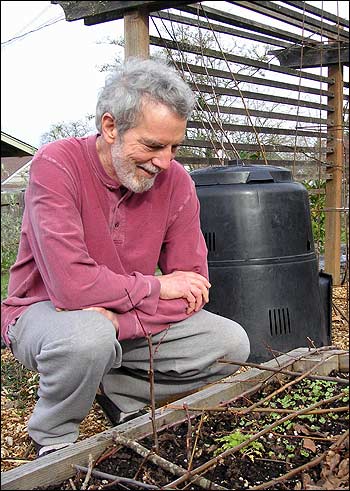Nesting Green Home & Garden Special Issue
Permaculturing South Lane Fern Hill Nursery offers large collection
How Do I Get Myself Some Birds? Birders, in their own backyards
Downsize to a Greener Lifestyle Kurt Jensen’s little houses for better living
Seed, Save, Share A revolutionary act against commercial seed industry
Green and Cheap BRING offers remodel options that go easy on the budget
Seed, Save, Share
A revolutionary act against commercial seed industry
By Rachel Foster
Those peas I planted in a raised bed a few weeks ago were up in less than two weeks, preceded first by radishes, then arugula. Who knows what the weather may do now and whether they will flourish. At least I had the pleasure of watching the seeds sprout. Seeds I deliberately planted, that is. Germination has always been part of my gardening life because I appreciate the volunteers (usually decorative, but occasionally edible) that crop up in my gardens. From time to time I have even scattered seed of love-in-a-mist, a poppy or my favorite white foxglove directly from the pod, but somehow that wasn’t quite the same.
 |
| Randy McGowen admires radish starts |
The satisfaction in watching veggie seeds germinate got me meditating on the state of the seed industry. A handful of corporations now own the production of half the world’s seed, perhaps more. A few years ago one of those companies, Monsanto, notorious for its ruthless promotion of GMO crops and weed killer, bought up Seminis Vegetable Seeds Inc., the world’s largest seed producer. Almost all seed retailers handle Seminis seeds, which include many varieties purchased by organic growers.
This concentration of seed production has had the effect of reducing the range of seed varieties available, squeezing out many of lesser commercial value. Some people say this trend has slowed with the growing enthusiasm for home vegetable gardening. Let’s hope so. There is also the issue of contamination by GMOs. Pollen travels, and organic seed producers and breeders see their businesses threatened by the cultivation of GM alfalfa, beets or kale too close to their land. The USDA argues that contamination by GM genes doesn’t matter, but the current definition of organic includes freedom from GMOs, and that’s the way most of us want it.
One way to thumb your nose at Monsanto and company is to save your own seeds. Saving and sowing your own is no longer simply a pleasure or a necessity, depending on your circumstances; it has come to feel like a revolutionary act. In reality, though, not every vegetable gardener is going to save seed. It takes extra ground, extra work and attention to detail. Except for the easiest, self-pollinating crops, successful seed saving requires isolating crops from one another and, in some cases, from their wild relatives. For the most part you’ll need to stick with open pollinated (OP) seed sources, and you may lose out on some of the vigor and productivity associated with hybrid seed.
There are several practical arguments for saving seed, however, besides economy and subversion. One of the things that gets lost with mega-ownership of seed production is a wealth of varieties naturally selected to succeed in the place where they grow. Then there is taste preference. If you grow your own tomatoes, you’ll favor one that tastes the way you like it. It won’t matter very much to you what its shelf life is or whether the skin is tough enough to survive a trip to market. In growing and saving seed from a particularly tasty variety, you are helping to perpetuate the line.
Many people in the Willamette Valley community of gardeners and farmers are deeply concerned about threats to seed and crop diversity and are doing something about it.
The 2010 Spring Propagation Fair will be held March 13, 2010 at LCC Cafeteria, 10 am to 4 pm. This event is a free exchange of vegetable seed and fruit-tree cuttings, called “scions.” Grafting help (free) and rootstock (for a small charge) will be available. There will also be workshops. If you can, bring your own seeds, plants, or fruit cuttings to share. Sponsoring organizations include the Eugene Permaculture Guild, the Seed Ambassadors Project, the National Clonal Germplasm Repository and Food Not Lawns.
For a comprehensive account of seed saving and plant breeding in all its aspects, see Breed Your Own Vegetable Varieties: The Gardener’s and Farmer’s Guide to Plant Breeding and Seed Saving by Corvallis author Carol Deppe. (An older, smaller and less ambitious book by Marc Rogers, Saving Seeds, is still a useful introduction to the topic.)
Rachel Foster of Eugene is a writer and garden consultant. She can be reached at rfoster@efn.org